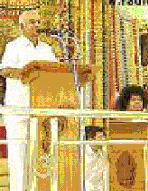|
G. Venkataraman is
keen to imprint on his readers that, in studying anything about science,
they are observing “The Glory of God”. This is, of course, an assumption and is not even
a testable hypothesis, being a vague (undefined and indefinite) conception
which is entirely non-operational. It is wrong to write about science
from the viewpoint of a “true believer” in Sathya Sai Baba as God
the Creator Incarnate, as Venkataraman does.
Dr. Venkataraman
takes after Sathya Sai Baba and all others who try to convince through
‘sham reasoning’. Philosopher C.S. Peirce explained this as “pseudo-inquiry
aimed not at finding the truth but at making a case for some conclusion
immovably believed in advance”. Trying to foreshorten science to fit
onto the Procrustean bed of religious belief, forcing personal and subjective
interpretations onto scientific facts and theories – while presenting
oneself as ‘a scientist’ while one is writing mainly
as a believer is to disqualify oneself completely as a serious thinker.
When the patina of well-known scientific facts is stripped off, only
preaching what Sai Baba has claimed remains.
|
|
 |
Science
and Belief in God : To accept Sathya Sai Baba as a universal teacher
also means accepting ‘Creationism’ (see here), That is a totally discredited quasi-theory, banned from education
by a 1987 Supreme Court ruling.Venkataraman’s attempt to misuse
science to support his belief in God does not befit anyone who truly
bends to the scientific spirit. Among the millions of scientists today,
believers in a God creator and regulator of the universe are in a minority
which is gradually decreasing. As Professor Dawkins, a world-famous
scientist as a foremost geneticist and evolutionary scientist and also
as a non-believer in religion, has pointed out in his super bestseller
The God Delusion - hardly any truly notable scientists today
believe in God. (read his 1’st chapter here
http://richarddawkins.net/godDelusion#firstChapter). Dawkins
writes: “The only website I could find that claimed to list ‘Nobel-Prize-winning
Scientific Christians’ came up with six, out of a total of several
hundred scientific Nobelists” [The God Delusion paperback -
page 126]. Another interesting research shows how scientists in general
are far less religious than average [
http://www.livescience.com/history/070629_religious_scientists.html
].
Einstein
was not a religious believer in God
Venkataraman
has promoted many famous scientists in his popularistic series (see
my previous blog here) – as if this thereby lends credence to his
main contention: to believe in God. Religionists – especially Sai
followers in their endless hagiographies - try their utmost to allege
that many scientists are believers, particularly referring to the incomparable
Albert Einstein. However, Einstein wrote: “It was of course a lie
when you read about my religious convictions, a lie which is being systematically
repeated. I do not believe in a personal God and I have never denied
this but have expressed it clearly” (see here). “The idea
of a personal God is quite alien to me and seems even naïve.” [Albert
Einstein in a letter to Beatrice Frohlich, December 17, 1952; Einstein
Archive 59-797; from Alice Calaprice, ed., The Expanded Quotable
Einstein, Princeton, New Jersey: Princeton University Press, 2000,
p. 217. ] Einstein used the word God occasionally but never in the religious
sense or as a Creator [as in ‘God does not play dice’- an analogy
for causal determinism, in which Einstein did believe].
|
